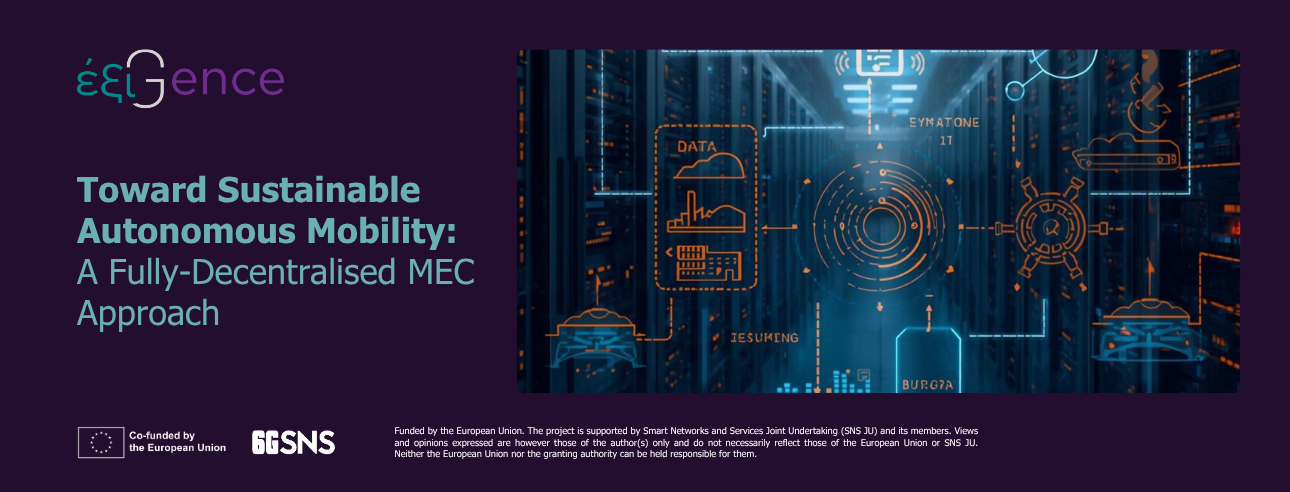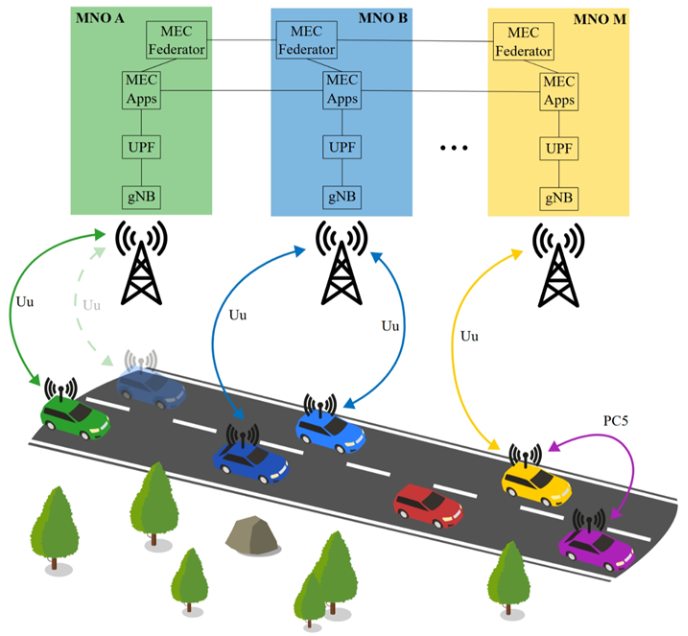
The Information and Communication Technology (ICT) sector stands at a critical juncture in global sustainability efforts. With projections indicating ICT could account for up to 20% of global CO₂ emissions by 2030, the urgency for sustainable solutions has never been greater [1]. However, achieving meaningful decarbonisation faces a fundamental barrier: multi-stakeholder interoperability. In multi-domain network environments – where multiple Mobile Network Operators (MNOs), cloud providers, and edge computing platforms must collaborate – effective coordination requires data sharing for optimal resource orchestration [2]. Yet, in practice, stakeholders operate as competitors, making them reluctant to expose private operational data such as real-time energy consumption, computational capacity, or user association patterns.
This creates a sustainability paradox: we cannot optimise what we cannot measure, and we cannot measure what stakeholders will not share. The challenge, therefore, is not just technical but behavioural: how do we enable and motivate stakeholders to participate in collaborative optimisation without compromising their competitive interests?
The Interoperability Barrier to Sustainable ICT
The transition to sustainable ICT management requires coordinated action across multiple domains, but several critical barriers emerge:
- Data Privacy Concerns: Stakeholders rightly protect sensitive operational data that could reveal competitive advantages or vulnerabilities.
- Misaligned Incentives: Without trust mechanisms, stakeholders prioritise individual optimisation over collective efficiency.
- Technical Limitations: Current decentralised solutions often rely on blockchain or cryptographic approaches that still require some level of data exposure or trusted third parties [3]-[4].
These barriers create a stalemate where potential energy savings and carbon reductions remain unrealised because the fundamental prerequisite – willing participation – is missing.
A Fully-Decentralised Orchestration Approach
The fully-decentralised algorithm embeds orchestration logic directly into individual MEC servers, creating a system where each entity operates autonomously yet collaboratively [5]. Rather than relying on a central authority, each stakeholder makes local decisions based on limited, non-sensitive information exchanged with adjacent participants. This approach utilises iterative gradient-based updates, allowing the system to progressively refine its decisions without ever requiring the exposure of private operational data. Through this carefully designed process, the network converges globally optimal solutions while preserving each stakeholder’s confidential information.

Figure: High-Level fully-decentralised multi-MNO autonomous mobility Architecture.
This architectural approach fundamentally transforms the stakeholder participation calculus. By eliminating the requirement to sacrifice competitive advantage, the traditional barriers to collaborative optimisation simply disappear. Stakeholders gain the ability to achieve improved energy efficiency through intelligent load distribution across the federated network, leading to significantly reduced operational costs via optimised resource utilisation. Furthermore, participants benefit from enhanced service quality manifested through lower latency and improved reliability, while simultaneously contributing to carbon footprint reduction through dynamic service migration that prioritises energy-aware routing and computation. The transformative aspect lies in achieving all these benefits while maintaining complete control over proprietary operational data, creating a win-win scenario that finally aligns individual stakeholder interests with collective sustainability goals.
Validated in Autonomous Mobility, Applicable Across ICT
In the autonomous mobility domain, this fully-decentralised approach has demonstrated remarkable performance outcomes that validate its practical viability [6]. The implementation achieved an 86.7% reduction in latency, bringing average response times down to just 33.2 milliseconds, while simultaneously delivering an 88.1% reduction in energy consumption with average power usage measured at 8.1 watts. Most significantly, these substantial improvements were accomplished while enabling seamless inter-MNO cooperation completely without data exposure, proving that competitive stakeholders can collaborate effectively without compromising their proprietary information or competitive advantages.
The implications of this privacy-preserving decentralised model extend far beyond vehicular networks, offering transformative potential across multiple ICT domains. The same architectural principles can revolutionise multi-cloud resource orchestration, allowing enterprises to optimise workload placement across different cloud providers without revealing sensitive operational details to competitors or third parties. In telecommunications, this approach enables efficient cross-domain 5G and 6G network slicing, where multiple network operators can collaboratively deliver end-to-end services while maintaining full control over their respective network resource information. The model similarly benefits distributed edge computing ecosystems by facilitating intelligent service migration across different edge providers’ infrastructures without requiring them to disclose capacity limitations or utilisation patterns. Furthermore, inter-provider content delivery networks can leverage this framework to optimise content distribution paths across multiple carrier networks while preserving each provider’s routing strategies and network topology confidentiality. This breadth of applicability demonstrates the framework’s potential to become a foundational architecture for sustainable, privacy-aware collaboration across the entire ICT landscape.
Conclusion
The fully-decentralised approach represents more than just a technical solution – it offers a new paradigm for sustainable ICT management. By solving the fundamental trust and privacy barriers that have hindered multi-stakeholder collaboration, it enables the kind of cross-domain optimisation essential for meaningful decarbonisation.
As we move toward 6G networks and increasingly complex digital ecosystems, this privacy-preserving framework provides the missing piece: a way to align individual stakeholder interests with collective sustainability goals. The result is not just more efficient networks, but a viable path toward truly sustainable digital infrastructure.
References
1] H. R. Chi, D. Corujo and R. L. Aguiar, “Carbon-Aware Full-Decentralized Multi-Provider Edge Computing Peer Offloading,” 2024 IEEE 22nd International Conference on Industrial Informatics (INDIN), Beijing, China, 2024, pp. 1-6, doi: 10.1109/INDIN58382.2024.10774500.
[2] D. Santos, D. Corujo, J. Quevedo, and R. Aguiar, “Network federation: Challenges and opportunities,” Internet Technol. Lett., vol. 7, no. 3, p. e483, 2024, doi: 10.1002/itl2.483.
[3] A. Singh et al., “Blockchain-based lightweight authentication protocol for next-generation trustworthy Internet of Vehicles communication,” IEEE Trans. Consum. Electron., vol. 70, no. 2, pp. 4898–4907, May 2024, doi: 10.1109/TCE.2024.3351221.
[4] V. K. Quy, A. Chehri, N. M. Quy, V.-H. Nguyen, and N. T. Ban, “An efficient routing algorithm for self-Organizing networks in 5G-based intelligent transportation systems,” IEEE Trans. Consum. Electron., vol. 70, no. 1, pp. 1757–1765, Feb. 2024, doi: 10.1109/TCE.2023.3329390.
[5] H. R. Chi and A. Radwan, “Fully-Decentralized fairness-aware federated MEC small-cell peer-offloading for enterprise management networks,” IEEE Trans. Ind. Informat., vol. 19, no. 1, pp. 644–652, Jan. 2023, doi: 10.1109/TII.2022.3193900.
[6] D. Santos et al., “Fully-Decentralized Multi-MNO Interoperability of MEC-Enabled Cooperative Autonomous Mobility,” in IEEE Transactions on Consumer Electronics, vol. 71, no. 2, pp. 2654-2665, May 2025, doi: 10.1109/TCE.2025.3569343.
Authors

Instituto de Telecomunicacoes
Haoran Chi is a senior researcher in the Instituto de Telecomunicacoes, Portugal. He has obtained expertise on 5G (beyond) telecommunication, network management and optimisation, and machine learning. He has plenty of experience in European project management. He is also proactive in scientific community, serving as the Senior Editor and Associate Editor of multiple IEEE journals, the Secretory of IEEE IES TC BACM, and Chair/co-Chair of multiple IEEE Standards.

Instituto de Telecomunicacoes
Daniel Corujo is an Associate Professor at the University of Aveiro and a researcher at Instituto de Telecomunicações. His work focuses on 5G/6G networks, SDN, NFV, and Information-centric Networking. He has contributed to international projects, IETF/IRTF and IEEE standardisation, authored over 130 Scopus-indexed papers, and serves as Vice-Chair of the IEEE ComSoc Portugal Chapter.
